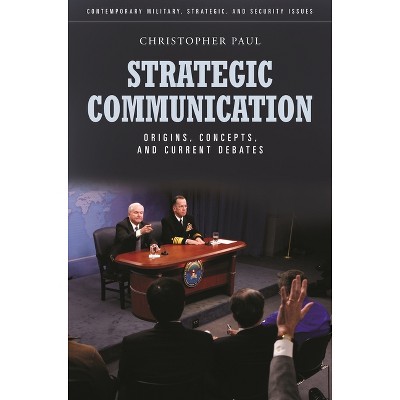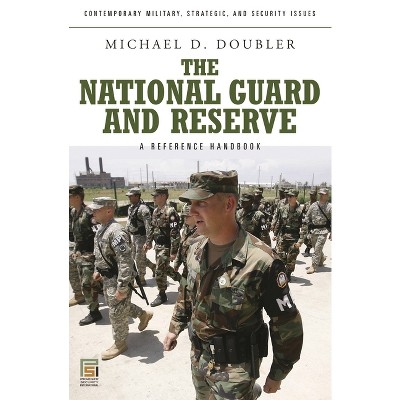Sponsored

Intelligence and National Security - by John Clark (Hardcover)
In Stock
Sponsored
About this item
Highlights
- Clark presents a brief history of the creation and development of the intelligence services in the United States.
- About the Author: J. Ransom Clark, a 25-year veteran of the Central Intelligence Agency (CIA), has worked assignments from Asia, Europe, Latin America, to the Middle East, and Washington, D.C.
- 208 Pages
- Political Science, Intelligence & Espionage
Description
About the Book
Clark presents a brief history of the creation and development of the intelligence services in the United States. He centers his examination on the two main constants in the American way of gathering, processing, analyzing, and using intelligence; change and a concern for the impact of secret activities on democratic government. Resolving the ever-growing need for informed decision making continues to put pressure on the country's ability to manage and provide oversight of intelligence. Clark assesses how those forces have resulted in ongoing changes to the intelligence apparatus in the United States. Consistent with other volumes in this series, Clark supplements his narrative with key documents and brief biographies of influential personalities within the intelligence community to further illustrate his conclusions.
Clark provides a current, explanatory text and reference work that deals with what intelligence is, what it can and cannot do, how it functions, and why it matters within the context of furthering American national security. He describes the U.S. intelligence community prior to WWII, demonstrating that intellignece gathering and espionage have played a key role in national security and warfare since the inception of the Republic. Through their ubiquity, Clark establishes them as a necessary function of government and governmental decision making. Today, the intelligence apparatus encompasses numerous activities and organizations. They are all responsible for different parts of the practice of collecting, processing, analyzing, disseminating, and using intelligence. With the demise of the Soviet Union in 1991, significant stresses began to appear in the U.S. approach to the intelligence process; Clark concludes by chronicling those stresses and the attendant drive for change was accelerated after the terrorist attacks of September 11, 2001.
Book Synopsis
Clark presents a brief history of the creation and development of the intelligence services in the United States. He centers his examination on the two main constants in the American way of gathering, processing, analyzing, and using intelligence; change and a concern for the impact of secret activities on democratic government. Resolving the ever-growing need for informed decision making continues to put pressure on the country's ability to manage and provide oversight of intelligence. Clark assesses how those forces have resulted in ongoing changes to the intelligence apparatus in the United States. Consistent with other volumes in this series, Clark supplements his narrative with key documents and brief biographies of influential personalities within the intelligence community to further illustrate his conclusions.
Clark provides a current, explanatory text and reference work that deals with what intelligence is, what it can and cannot do, how it functions, and why it matters within the context of furthering American national security. He describes the U.S. intelligence community prior to WWII, demonstrating that intellignece gathering and espionage have played a key role in national security and warfare since the inception of the Republic. Through their ubiquity, Clark establishes them as a necessary function of government and governmental decision making. Today, the intelligence apparatus encompasses numerous activities and organizations. They are all responsible for different parts of the practice of collecting, processing, analyzing, disseminating, and using intelligence. With the demise of the Soviet Union in 1991, significant stresses began to appear in the U.S. approach to the intelligence process; Clark concludes by chronicling those stresses and the attendant drive for change was accelerated after the terrorist attacks of September 11, 2001.Review Quotes
"This work is recommended for libraries desirous of having strong intelligence and national security collections." --American Reference Books Annual
"[P]rovides college-level and military collections with an excellent survey and analysis of what intelligence is and how it functions under the umbrella of American national security. From the initial creation of intelligence services and divisions within the U.S. to ways the information is gathered and analyzed, Intelligence and National Security packs a blend of history and military and social analysis, making it an excellent starting point for any discussion on the topic." --The Bookwatch "Clark, who is retired from the Central Intelligence Agency, discusses the intelligence field, beginning with the development of American intelligence since the Revolutionary War up to how things have changed since 9/11, in addition to the process of obtaining intelligence, analysis, security, covert action, and the continuing need for intelligence since the terrorist attacks. Biographies of key individuals and some documents, such as the National Security Act of 1947, are presented in the appendices. The volume is aimed at a general audience." --Reference and Research Book NewsAbout the Author
J. Ransom Clark, a 25-year veteran of the Central Intelligence Agency (CIA), has worked assignments from Asia, Europe, Latin America, to the Middle East, and Washington, D.C. He retired in 1990 as a member of the CIA's Senior Intelligence Service. From 1990 until his second retirement in 2005, Clark taught and held administrative positions at Muskingum College in New Concord, Ohio. His honors include the CIA's Medal of Merit and Muskingum College's Excellence in Teaching and Faculty Service awards. Clark maintains an extensive website on intelligence - The Literature of Intelligence: A Bibliography of Materials, with Essays, Reviews, and Comments at http: //intellit.orgShipping details
Return details
Trending Current Affairs & Politics











